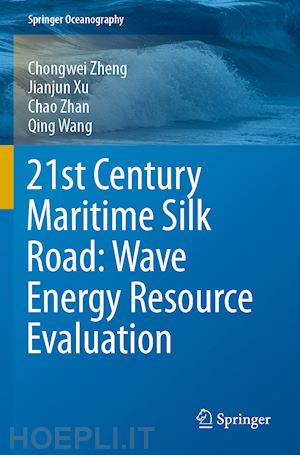
Questo prodotto usufruisce delle SPEDIZIONI GRATIS
selezionando l'opzione Corriere Veloce in fase di ordine.
Pagabile anche con Carta della cultura giovani e del merito, 18App Bonus Cultura e Carta del Docente
This book focuses on the evaluation of wave energy in the Maritime Silk Road. Firstly, it compares wave energy and other main energy sources, and then discusses the various disadvantages. It also presents the current research and the difficulties of wave energy evaluation, and systematically analyzes the climatic characteristics of the wave energy, including the temporal–spatial distribution and climatic trend of a series of key factors (e.g. wave power density, availability, richness, stability, energy direction, energy storage). It then describes the design of a short-term forecasting scheme and a long-term projection scheme of wave energy suitable for the Maritime Silk Road, to serve as a plan for the daily operation and long-term development of wave energy. Further, it highlights the wave energy analysis and decision-making in the context of the remote islands and reefs, using Sri Lanka is taken as a case study. Lastly, it presents the first wave energy resource dataset for theMaritime Silk Road.
This book is one of a series of publications on the 21st century Maritime Silk Road (shortened as “Maritime Silk Road”) that covers the characteristics of the marine environment and marine new energy, remote islands and reef construction, climate change, early warning of wave disasters, legal escort, marine environment and energy big data construction, contributing to the safe and efficient construction of the Maritime Silk Road. It aims to improve our knowledge of the ocean, and so improve the capacity for marine construction, enhance the viability of remote islands and reefs, ease the energy crisis and protect the ecological environment and improve the quality of life of residents along the Maritime Silk Road, as well as to protect the rights, and interests of the countries and regions participating in the construction of the Maritime Silk Road.
This book is a valuable reference resource for decision-makers, researchers, and marine engineers working in the related fields.
Introduction.- Research progress of wave energy evaluation.- Temporal-spatial distribution of wave energy in the Maritime Silk Road.- Climatic trend of wave energy in the Maritime Silk Road.- Short-term forecast of wave energy in the Maritime Silk Road.- Long-term projection of wave energy in the Maritime Silk Road.- Wave energy assessment and proposal in the Sri Lankan waters.- Dataset construction of wave energy resources in the Maritime Silk Road.- Prospects of wave energy evaluation.
Dr. Chongwei Zheng is the creator and organizer of the Marine Resources and Environment Research Group on the Maritime Silk Road. His research fields cover physical oceanography, wind energy and wave-energy resources evaluation, wind and wave climate, and climate change. He has published more than 90 papers in various leading, peer-reviewed journals. He has also published six books as the first author. He is a reviewer for more than 40 high-impact journals (including Applied Energy, Remote Sensing of Environment). He is also a monograph reviewer for Elsevier. He has provided data and theoretical/technical assistance to researchers from Russia and Canada. His project titled “Wave energy and offshore wind energy resources evaluation of the Maritime Silk Road” won the Marine Engineering Science and Technology award from the China Association of Oceanic Engineering.
Jianjun Xu is currently a Professor at the College of Ocean and Meteorology, Guangdong Ocean University. His expertise is mesoscale numerical modelling, satellite remote sense and air–sea interaction. He holds bachelor and master degrees in Atmospheric Sciences from Nanjing University in China and a Ph.D. degree from Nanjing Institute of Meteorology. He was a research scientist at the City University of Hong Kong, New Mexico Tech, and the University of Arizona, a project scientist at JCSDA and Research Professor at George Mason University. He has published over 140 papers in professional journals. He has mastered all kinds of statistical methods for data analysis, and the global/regional modeling for weather forecasts.
Chao Zhan holds a Doctor of Environmental Science degree from the Chinese Academy of Sciences. She has long been engaged in estuarine coastal environment and monitoring research. In the past 5 years, she has been involved in projects for the National Natural Science Foundation, National Key Research and Development, Natural Science Foundation of Shandong Province, Ministry of Ecology and Environment and Ministry of Natural Resources. She was the main researcher in five National Natural Science Foundation projects. She has published more than 10 papers in various peer-reviewed journals as the first author or corresponding author.
Qing Wang graduated in 1997 with a Doctor of Geomorphology and Quaternary Geology degree from Peking University. He is a Professor and Ph.D. supervisor at Lu Dong University and team leader. He is a member of the Teaching Steering Committee of the Ministry of Education Department of Geography Science in Higher Education Institutions and the Chairman of Shandong Province. He is the Vice Chairman of the Estuary Coastal Branch of the Chinese Society for Oceanology and Limnology. He has long been engaged in estuarine coastal environment and monitoring research. In the last 5 years, he has been involved in 5 National Natural Science Foundation projects (including a key project). He has published more than 60papers in various peer-reviewed journals as the first author or corresponding author.











Il sito utilizza cookie ed altri strumenti di tracciamento che raccolgono informazioni dal dispositivo dell’utente. Oltre ai cookie tecnici ed analitici aggregati, strettamente necessari per il funzionamento di questo sito web, previo consenso dell’utente possono essere installati cookie di profilazione e marketing e cookie dei social media. Cliccando su “Accetto tutti i cookie” saranno attivate tutte le categorie di cookie. Per accettare solo deterninate categorie di cookie, cliccare invece su “Impostazioni cookie”. Chiudendo il banner o continuando a navigare saranno installati solo cookie tecnici. Per maggiori dettagli, consultare la Cookie Policy.